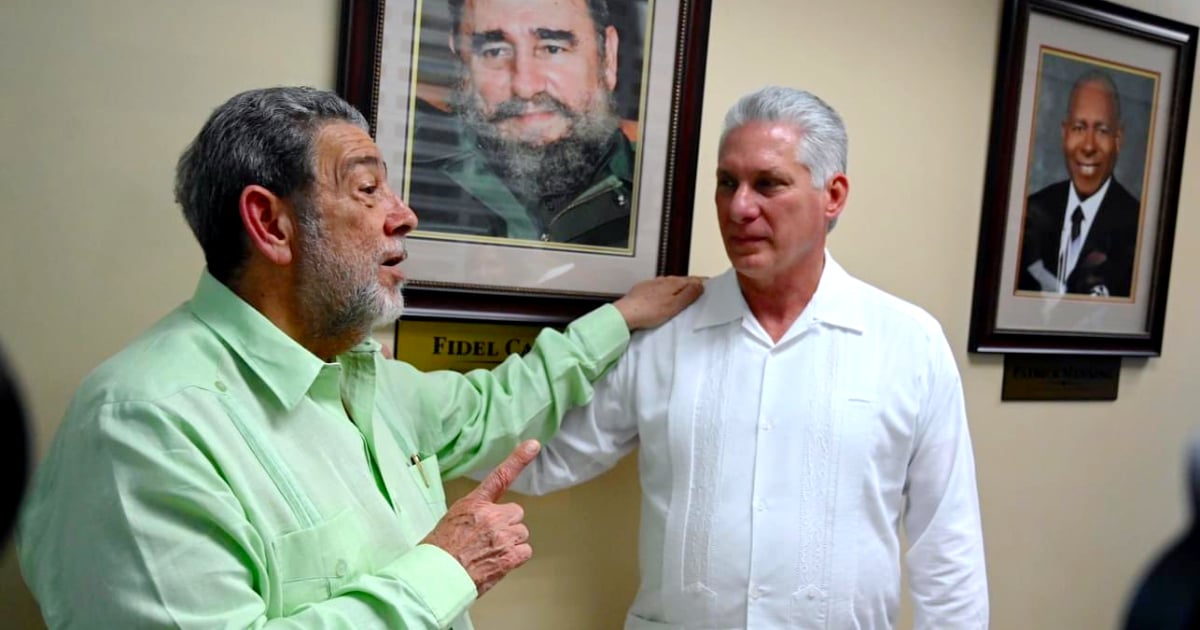Ralph Gonsalves, the Prime Minister of Saint Vincent and the Grenadines, has stirred controversy by defending Cuba's medical missions with a contentious argument. He claimed that Cuban healthcare professionals should surrender a portion of their salaries to the Cuban regime because they received "free education." This statement came in response to the United States' decision to impose sanctions on officials from third-party countries that hire Cuban doctors under exploitative conditions, sparking intense debate about the labor rights of these professionals.
According to Gonsalves, "It is said that the Cuban professionals here under the agreement with the Cuban government had to pay, I don't know if it's 10 percent or 15 percent, whatever, of their salary to the Cuban government. But that doesn't mean they are exploited. They received free education. And if they go abroad, earning money with that education, it's not unreasonable to contribute something so more people can be educated," as reported by Cubainformación.
Exploitation Allegations: Modern-Day Slavery and Human Trafficking
Cuban medical brigades have been labeled by human rights organizations as a system of labor exploitation. Gonsalves' remarks dismiss repeated international concerns about the semi-slavery conditions Cuban doctors face abroad. These medical professionals are sent to foreign countries without full labor rights, under strict supervision by the Cuban regime, and are compelled to hand over up to 85% of their salaries to the state. Additionally, their passports are confiscated, and they face severe repercussions if they attempt to leave the mission.
The United States government, through Secretary of State Marco Rubio, has intensified sanctions against this practice, expanding visa restrictions to officials from countries employing Cuban medical personnel under abusive conditions. The aim is to halt the "exportation of Cuban labor," which has become a major revenue source for the Havana regime.
U.S. Sanctions and Gonsalves' Defense
Reports from organizations like Human Rights Watch and the United Nations Special Rapporteur have condemned the conditions under which Cuban doctors work abroad, describing them as "modern-day slavery" and "human trafficking." These documents reveal how the Cuban regime imposes restrictions on professionals, including prohibiting travel with their families, withholding personal documents, and monitoring their movements by security agents.
Medical personnel attempting to defect are labeled as "traitors" and face penalties ranging from an eight-year ban on returning to Cuba to persecution of their families on the island. In the past, such accusations have led countries like Brazil and Bolivia to reassess their agreements with the Cuban regime and, in some cases, terminate medical cooperation programs.
Despite these sanctions, Gonsalves defended the program, insisting that Cuban doctors are essential to his country's healthcare system and downplaying the exploitation allegations. "If the Cubans are not here, we might not be able to run the service," he argued regarding the presence of medical staff at the Hemodialysis Unit in Saint Vincent and the Grenadines. He also suggested that criticism of the Cuban system stems from a "misunderstanding" by some sectors in the U.S.
Criticism of Cuban Presence in Saint Vincent and the Grenadines
The presence of Cuban doctors in Saint Vincent and the Grenadines has not been without controversy, but the close relationship between Cuban leader Miguel Díaz-Canel and the prime minister has dominated the ties between the two governments. In September 2024, citizens criticized the quality of service provided by Cuban doctors, citing deficiencies in care and communication problems due to language barriers. The lack of integration of Cuban doctors into the local healthcare system and complaints about their professional competencies have been a subject of public debate.
However, in December 2022, the Cuban leader's visit to Saint Vincent and the Grenadines left an unforgettable scene that drew mockery on social media for his awkward English and participation in a casual karaoke session, where he sang "Guantanamera" alongside Foreign Trade Minister Rodrigo Malmierca.
Key Issues Surrounding Cuban Medical Missions
What are the main criticisms of Cuban medical missions?
Critics argue that Cuban medical missions exploit doctors by requiring them to give up a significant portion of their salaries to the Cuban government, operating under conditions likened to modern-day slavery and human trafficking.
How has the U.S. responded to Cuban medical missions?
The U.S. has imposed sanctions on officials from countries hiring Cuban doctors under abusive conditions, aiming to stop the practice of exporting Cuban labor, which is a major revenue source for Cuba.
Why does Prime Minister Gonsalves support Cuban medical missions?
Prime Minister Gonsalves argues that Cuban doctors are crucial to his country's healthcare system and believes that their contributions to the Cuban government are justified by the free education they received.
